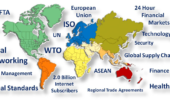Johannah Bernstein post: "eternally proud of my father’s extraordinary aeronautical engineering. legacy. here is a photo of the Canadair Water…
Canada and the world – The diplomat dilemma
Written by Diana Thebaud Nicholson // May 20, 2008 // Canada, Foreign Policy, Globalization, Government & Governance, Public Policy // Comments Off on Canada and the world – The diplomat dilemma
Related: Canada in the world ; The Arctic and Canada’s Foreign Policy
May 20, 2008
More than ever, we need able diplomats and negotiators to ensure that Canada is heard and listened to in international fora and diplomatic circles.
Canada’s declining role in Foreign affairs is closely related to the decline in prestige and treatment of our diplomats by their government. The success of these dedicated and often highly qualified specialists in large measure depends on their ability to decipher and interpret the politics and cultures of the countries to which they are posted, but is also dependent on the esteem in which they are held by the host country. If there is so little acknowledgment of their abilities – and needs – at home, how can we expect them to be respected abroad? Many succeed, despite, rather than because of their treatment by their own ministry where leadership is sorely lacking and there is little to encourage the development of the formidable talents of the previous generations of diplomats and administrators in this crucial arena. We submit that the sorry state of affairs is a reflection of the Harper government’s distaste for the subtler policy areas that cannot be defined by immovable lines of thought and action.
Craig Offman, National Post
Gone are the days when a life in foreign service meant intrigue and canapés
Last Wednesday, hundreds of Department of Foreign Affairs and International Trade workers gathered in Ottawa to hear the embattled ministry’s new “transformation agenda” at a town hall meeting at the Lester B. Pearson building.
The deputy ministers in charge promised to take questions — no matter how tough — and there was no shortage of elephants in the auditorium of a building, which has long been known for its fortress-like mentality as much as its appearance, as Fort Pearson.
An alarming mass exodus of staffers over the past year. Huge job vacancies. The dismissive treatment of diplomatic spouses. Cultural clashes between lifelong Liberal bureaucrats and their Tory overlords. Too many expats in peril, too few employees to deal with them, and constant criticism from families and prisoners such as Brenda Martin.
While the foreign service has been in a slow tailspin for the past two decades, being a diplomat is an especially thankless task these days. The romantic, Graham Greene era of the high-minded diplomat knee-deep in sweaty intrigue is long gone.
Now the diplomatic life is more likely to be about passport issuance, dingy accommodations and disgruntled spouses.
“Unless you’re really high up on the food chain, it’s not all canapés and cocktails,” said one former foreign service officer. “Not at all.”
Listening to the confab of about 500 employees on a conference call, however, one would never know that the ministry was on the brink of implosion.
Only in the dying minutes of this listless 90-minute session was there a flash of indignation. That’s when Roger Chan, a civil servant with 30 years of experience, announced that he was about to make a major proclamation.
“I feel like a silkworm about to be thrown into boiling oil,” he said.
While the discussion turned to the lack of diversity in the service, another colleague assured Mr. Chan he would turn into butterfly.
The larger question, however, is if the department could pull off what would be a remarkable, short-order metamorphosis.
Foreign services in many countries have already gone through similar convulsions, while Canberra and London have announced changes that provide more favourable taxation rules, better pay and improved spousal outreach.
In Ottawa, DFAIT, the Treasury Board and other government agencies have been quibbling over similar issues for more than two decades, but the need for immediate remedy is profound.
An internal survey from human resources found that a third of rotational-service employees polled have either transferred out of the department or left the government from 2006 to 2007. An Access to Information inquiry filed to DFAIT by Conservative MP Bill Casey also revealed that the number of people it lost to other departments more than doubled during the same period.
At the same time, the department’s job vacancy rate is estimated to be as high as 35% (the department will not provide exact numbers). It is also facing the widespread issue of sweeping generational change: as in the case of many government agencies, most of its managers are eligible for retirement in less than two years.
“This situation is not being taken very seriously,” said Liberal foreign affairs critic Bob Rae, stressing that a shrinking workforce will not be able to meet Canada’s growing needs abroad. “There is an increasing level of complexity outside of this country. We have to think about globalization in personal terms.”
The son of the late diplomat Saul Rae, the former Ontario premier said that the foreign service needs to hire more aggressively and bring people up through the ranks.
From the political side, however, he senses a lack of leadership.
“That whole area of government has been downgraded,” he said. “There is a floating crew of part-time foreign ministers who don’t have a clue. In Question Period you never know who is going to answer questions.”
Ostensibly, secretary of state for consular affairs Helena Guergis oversees issues involving Canadian citizens abroad, but since her controversial handling of the file of former Mexican prisoner Brenda Martin, her role, at least in Question Period, has been invisible.
Her boss, Foreign Affairs Minister Maxime Bernier, is in charge of all consulates, but he, too, is embattled. The opposition has been calling for his resignation on the pretext of a previous relationship to a woman with biker connections and his undiplomatic advice to Kandahar’s governor.
Leadership is also an issue on the bureaucratic side.
In a report delivered to Parliament’s Standing Committee on Public Accounts on April 28, Auditor-General Sheila Fraser dressed down the human resources department’s lack of foresight.
“Neither the recruitment nor the promotion processes were sufficient to find enough people with the required skills and competencies to fill the vacancies in the time required,” she said.
She noted that 58% of managers and 26% of all employees will be eligible to retire by 2010.
That is, if they can afford it.
Diplomats posted abroad are subject to quirky tax strictures that penalize double-income families. It is a long-standing point of contention among diplomats that the Treasury Board, which rules on such matters, is investigating. Several internal reports have identified treatment of spouses as the department’s hot-button issue.
Most Canadian families are dual-income, yet few foreign-service spouses can expect employment if they live outside the country. Almost 80% of foreign-service spouses were forced to quit their jobs back in Canada to follow their husbands — or in one-third of the cases, their wives. Many are left with a dim sense of purpose, even though 70% of them have undergraduate degrees, 36% with post-graduate degrees.
Former Canadian Air Force officer and MBA Eric Strong gave up a six-figure management-consultant job to be with his wife in Germany, but despite promises DFAIT made about reciprocal diplomatic agreements that would allow him unfettered access to the job market there, no such agreement existed.
What’s worse, he said, is the demeaning way he was treated by the department when he tried to get answers. “We get referred to as trailing spouses,” he said. “My wife was serving her country the way I used to. My place was with her.”
In the end, Mr. Strong said that spouses must grapple with grim financial security and gaping resume holes — and the self-esteem travails that unemployment brings.
Tova Lynch, who has followed her husband, Jim, for 30 years, faced a similar quandary.
While she took the occasional job, she, like many itinerant spouses, could not get work on a regular basis. She was also ineligible for EI because she did not reside in Canada for more than two years.
If she did happen to find work, usually as an embassy worker, she had to pay Canadian income tax, and pay EI and CPP premiums.
“The government recognizes prisoners after they get out, but not diplomatic spouses,” said Ms. Lynch, the interim president of the Foreign Service Community Association, a volunteer organization for rotational spouses.
Even if a couple manages to save money, their residency outside of Canada disqualifies them for an RRSP.



